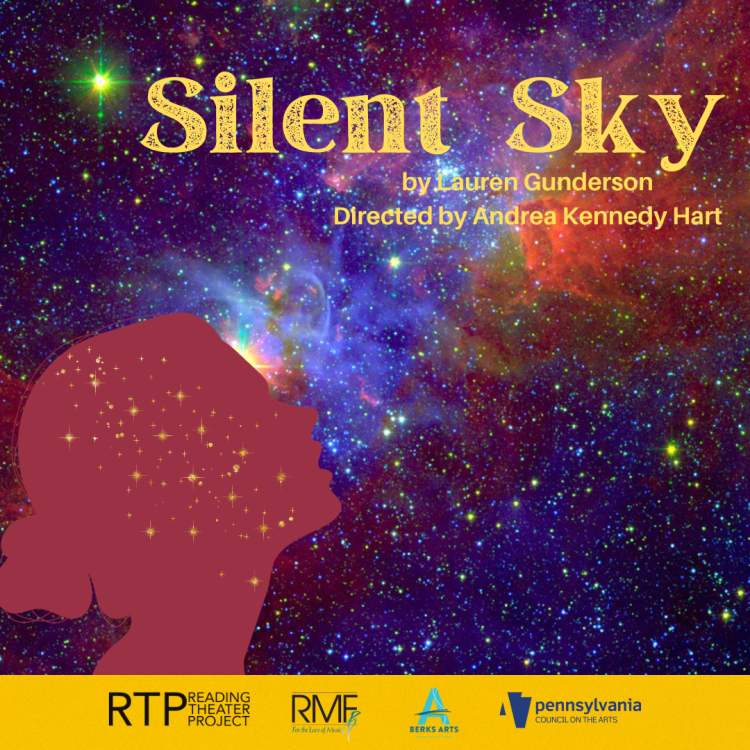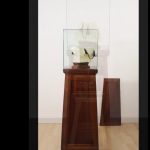At the heart of playwright Lauren Gunderson’s moving “Silent Sky” sits an evolving metaphor. Set at the beginning of the 20th century at a point where science and art connect, the play, produced by Reading Theater Project, is about exploration in general but specifically of outer space and the human soul.
Published in 2015, the drama was commissioned by South Coast Repertory Theatre in Costa Mesa, Calif., where it had its world premiere.
The work is inspired by the true story of the groundbreaking Harvard Observatory astronomer Henrietta Leavitt at a time when women were struggling for rights that men took for granted. In that sense, the themes of “Silent Sky” are as relevant today as they would have been in the early 1900s.
Reading Theater Project is best known for original works often set in Berks County, both one-act plays and full-length pieces. But every few years, the local professional company stages an existing play, endowing it with a regional sensibility or connecting it to current events.
According to RTP artistic director Vicki Haller Graff, the troupe asked Andrea Kennedy Hart, the new director of theater at the Yocum Institute for Arts Education, to direct the fall production and allowed Hart to choose the play.
“With the caveat that the play would reflect the interest and expectations of our audiences, with some local connection, not necessarily literal, and for it to be theatrical,” Graff added. “It also needed to fit this season’s overall theme, which is ‘Wonder.’ She (Hart) suggested a couple plays, but our Creative Team all very much connected to ‘Silent Sky.’”
Graff added that American Theatre magazine has called Gunderson, a native of Atlanta now living and teaching playwriting in San Francisco, the most produced playwright in the United States. Counting her short plays, she has written more than 30 works for the stage, as well as screenplays and short stories.
Gunderson considers herself an activist, and one can sense that proclivity in all her theater pieces. Feminism rattles the tensions in “Silent Sky,” but it’s also a love story, a play about family obligations and connections, and scientific discovery.
“The play examines the role of women in the academy and in science and in the world at large,” Graff said.
So, what’s the metaphor that energizes “Silent Sky?” Is it love as a metaphor for astronomy, or is it astronomy as a metaphor for love? The playwright seems to glean romance from the stars. But is there more to it?
“Yes to both,” said director Hart. “That’s one of the things that’s so beautiful about the play. I see it as astronomy as a metaphor for art. It’s all about leaning into curiosity, about focusing on the idea of wonder. It’s about thinking of things beyond ourselves.
“And that’s the same as the impulse to create theater as it is the impulse for Henrietta to figure out how to measure the distance between Earth and the stars. The more I read plays, I think they’re all about making art. This is a complicated play conceptually, but in the end, it’s actually very simple. The challenge here is to fight against playing just the metaphor, just the end of the text.
“Ultimately, science is an art, and art has a science to it. … I love Gunderson’s ideas. This play has big ideas and symbols and contrasts. Annie, one of the characters who works with Henrietta, says at one point she needs ‘the consistent, not the creative.’ But we can see that both exist. We can have chaos and order at the same time.”
In the play, as in life, Henrietta cashes in her dowery and leaves her Wisconsin home, and with it, her father and sister, to move to Boston to work at the Harvard Observatory. Her sister, Margaret, is a singer who also composes music. She is an artist but also a daughter, a sister, a wife, and eventually a mother and grandmother. And those things matter most to her.
Henrietta adores her family, but her true passion, her life’s calling, is science. Her talents are greater than those of most of the men for whom she works, but at the turn of the 20th century, those skills are unable to carry her to her rightful position in the field of astronomy. Two of her female co-workers, so-called “computers,” and the men who serve as her supervisors (one in particular) find her abilities intoxicating. Henrietta’s acumen energizes those spatially near to her, much in the way the sun energizes the planets that surround it.
As such, Hart, who is designing the play’s set as well, has opted for a three-quarter scenic plan to embrace that theme. With Henrietta as the focus, the others can orbit around her. The play’s shifting style, Hart explains, depends on the artful use of space, time, and light.
“Those are our tools as directors,” she said. “Gunderson’s writing simply flows. It moves constantly and quickly from one place to another. I need the actors to move as the words and action do, and this is how I can make that happen.”
Another thing about Gunderson’s language is its subtle sense of anachronism.
“I love that,” Hart said. “She acknowledges the historical moment but does not feel bound to its accuracy. That helps to lessen the century-long disconnect for the audience.”
“Silent Sky” calls on all of Hart’s training to breathe life into it. She holds a bachelor-of-arts degree from Wellesley College in theater and women’s studies, a master of fine arts degree in creative writing from Boston University, and a master of arts degree in theater from Villanova University.
“The play has a lot to say, apart from the idea of wonder,” Hart said. “When you’re observing, computing, analyzing, it creates a detachment from being present. Henrietta finds more balance from friends and family than she does from just the sky. It’s about being active participants in our lives instead of distant observers.”
Hart chose Meegan Gagnon for the central role of Henrietta in this five-character play, consisting of four women and one man (other cast members are Kathleen Brantman, Jane Ney, Aileen Lynch-McCulloch, and Griffin Yeyna). A musical-theater veteran, the Rochester, N.Y., native, now residing in Wyomissing, began playing straight dramatic roles in productions staged by Reading director John Gancar for the Fall Festival of the Arts.
She has had leading roles in “The Crucible” and “Watch on the Rhine.” At the Ephrata Performing Arts Center, she starred in “Agnes of God.” She played John Adams in Gancar’s mounting of the all-female musical production of “1776.” An occupational therapist by day, Gagnon is married and is the mother of three daughters, one of whom, Margaux, is the stage manager of “Silent Sky.”
Of Gagnon’s abilities, Hart said: “Meegan has a unique presence that radiates both strength and vulnerability, which is perfect for Henrietta. She’s so easy to believe.”
Gagnon studied at Russell Sage College in Troy, N.Y., concentrating on creative arts in therapy, music, and theater. She taught voice lessons for 20 years and then worked as the acting and voice coach for two of her daughters, both of whom performed in semi-professional theater.
One of the things she most admires about Gunderson’s writing in “Silent Sky” is its rhythm.
“It’s a little bit musical,” Gagnon said. “Being a singer, for me, that’s a gift.”
The biggest challenge in playing Henrietta, she confided, is the fluidity that permeates the play and this character especially.
“Other than a couple of short breaks, she is onstage all the time,” Gagnon said. “She’s happy at one moment, and then in a matter of seconds she’s crying. She’s very intense, feeling things to the maximum, and then she shifts in an instant. However, all the characters are fleshed out. All have their own arcs. I never have the feeling that Henrietta carries the show. We all carry this show together.”
Gagnon believes that Hart has created a rehearsal atmosphere conducive to creating art.
“I love working with Andrea because her brain works so differently from mine,” she said. “She sees things I would never see. She’s constantly creating. None of us feels boxed in. I feel as if we all have the freedom to experiment. Like the play, Andrea’s direction flows.”
“Silent Sky” will be performed from Nov. 2 through Nov. 5 in the Schumo Theater at the Yocum Institute for Arts Education, 3000 Penn Ave., West Lawn. All tickets are pay-what-you-will, with a recommended price of $20. For those who are able, the pay-it-forward cost is $40. Visit the website at www.readingtheaterproject.org to purchase tickets.
George Hatza is a director and writer and the former Entertainment Editor of the Reading Eagle. He is retired and living in Exeter Township.




